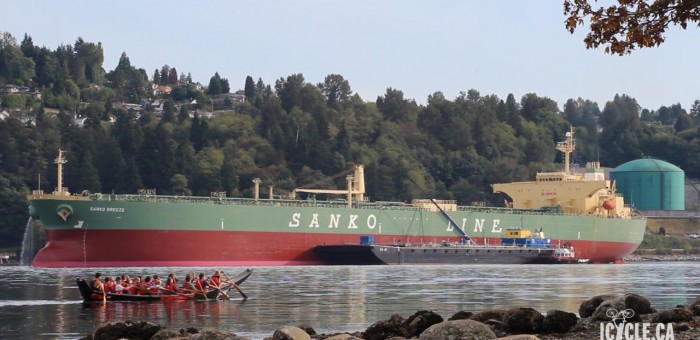Media Release
Repositioning British Columbia once more as a leader in climate solutions & the new economy
Today in the legislature the Minister of the Environment introduced important legislation that represents a critical first step in putting British Columbia back on track as a leader in climate solutions & the new economy.
The bill, entitled Greenhouse Gas Reduction Targets Amendment Act, 2018, commits British Columbia to reducing greenhouse gas emissions to 40% below 2007 levels by 2030 and 60% below 2007 levels by 2040. It further requires the government to release a report every two years that provides:
- a determination of the risks to BC that could reasonably be expected to result from a changing climate,
- the progress that has been made toward reducing those risks,
- the actions that have been taken to achieve that progress, and
- the plans to continue that progress.
Why this is an important first step is that these new targets send a signal to the market that British Columbia is once more serious about reducing greenhouse gas emissions. In addition, it gives a very clear goal to the civil service who will be tasked with putting together a wedge analysis that will allow us to meet the new targets.
The opportunities for innovation in the transition to the low carbon economy are limitless and British Columbia stands to reap the economic benefits associated with this transition in the years ahead.
Below I reproduce the government new release that was issued when the bill was tabled in the legislature.
Government News Release
New bill updates targets for reducing carbon pollution
The Government of British Columbia has introduced legislation to update the Province’s greenhouse gas reduction targets, setting the stage for a renewed climate action strategy to be released in the fall.
The Climate Change Accountability Act replaces the 2007 Greenhouse Gas (GHG) Reduction Targets Act. It sets new legislated targets of a 40% reduction in carbon emissions from 2007 levels by 2030, and a 60% reduction from 2007 levels by 2040. The current target of an 80% reduction in emissions by 2050 remains. The legislation will provide a framework to develop detailed climate-change adaptation reports. The Province will work with the broader public sector on these requirements. The legislation also enables the minister to set sectoral GHG emission reduction targets.
“The act is the foundation for a credible and achievable climate action strategy in B.C.,” said George Heyman, Minister of Environment and Climate Change Strategy. “The previous government, after stalling on sustained climate action for several years, admitted they could not meet their 2020 target, and those targets are repealed in this act.
“We aim to remove barriers, and make it attractive and affordable for people, communities and industry to move to lower-carbon alternatives. At the same time, we will grow an economy that’s stronger, cleaner, more diverse and more resilient.”
Climate action is an important component of the Confidence and Supply Agreement with the B.C. Green Party caucus.
“This legislation is another step forward towards making B.C. a leader in climate action once again,” said Andrew Weaver, leader of the B.C. Green Party. “This is a huge opportunity to build a thriving 21st-century economy centred around innovation. I look forward to working in partnership with the government to implement a plan to reclaim this leadership, and keep our commitment to younger generations.”
The Province’s climate action strategy will be released in autumn 2018. Actions to reduce the provincial GHG emissions will include establishing sectoral plans for buildings and communities, industry and transportation sectors.
Introducing legislation to support companies that pursue social and environmental goals
Today in Vancouver I met with a group of business leaders in Vancouver to discuss legislation I plan to table next week that would enable us in British Columbia to lead the country in supporting businesses that want to be a bigger part of developing innovative solutions to the challenges of the 21st century.
Over the last few months my legislative staff and I have been working with these and other stakeholders to craft legislation that would enable a new classification of companies in British Columbia — The Benefit Company.
A benefit company is profit driven but gives consideration to the impact it is having on the environment, its workers, the community, suppliers and customers, and can direct profits to the public benefit versus solely to shareholders. This legislation would provide a legal framework for companies that choose to pursue social and environmental goals and operate in a responsible and sustainable manner. By making B.C. the first jurisdiction in Canada to allow businesses to incorporate as benefit companies, we are sending a strong signal about the kind of economy we want for our province. Already, more than 30 states in the US have Benefit Company enabling legislation.
Below I reproduce the press release that we released after the roundtable discussion. I also append my initial speech at the media availability.
Media Release
Andrew Weaver to introduce legislation to support companies that pursue social and environmental goals
For Immediate Release
May 2, 2018
VANCOUVER, B.C. – Andrew Weaver, leader of the B.C. Green Party, announced today that he will introduce legislation that would enable B.C. companies to incorporate as benefit companies. The bill, which Weaver announced following a roundtable with business leaders in Vancouver, would amend the Business Corporations Act to allow companies that choose to incorporate as benefit companies to pursue social and environmental goals, rather than just profit.
“This legislation is an opportunity for B.C. to lead the country in supporting businesses that want to be a bigger part of developing innovative solutions to the challenges of the 21st century,” said Weaver.
“The world is experiencing tectonic shifts – from climate change to automation, we need to think differently in order to turn these challenges into opportunities. Government and individuals cannot solve these problems alone. Businesses play a huge role in our society and they are part of the solution. Companies that pursue a triple bottom line are on the cutting edge of rethinking the role of business in the 21st century. They know that acting in the best interests of people and the planet is the best way to build a thriving economy for the long-term.
“This legislation would provide a legal framework for companies that choose to pursue social and environmental goals and operate in a responsible and sustainable manner. By making B.C. the first jurisdiction in Canada to allow businesses to incorporate as benefit companies, we are sending a strong signal about the kind of economy we want for our province.”
Weaver’s bill is his caucus’ first bill to be put through the official legislative drafting process, making it possible that this could be the first Private Member’s Bill in B.C.’s history to be passed into law.
Quotes:
“With so many diverse and innovative companies doing great work, B.C. is a fantastic place to invest. Companies that incorporate environmental and social considerations into their business models demonstrate that they have a long-term vision for their role in the province. Enacting Benefit Company legislation sends a signal to the business community that government supports companies that want to use their business as a force for good.”
- Joel Solomon, Chair & Co-Founder, Renewal Funds
“The values of social and environmental responsibility inform everything we do at Keela. Building a company on these values sends a clear signal to our clients about what we stand for and demonstrates that our company is built to last. This legislation will encourage more BC companies to incorporate these values into their own business, empowering them to promote social and environmental change in our province.”
- Nejeed Kassam, CEO, Keela
“The proposed legislation will surely be welcomed by the growing community of impact investors in British Columbia. Benefit corporation status will give these investors additional confidence that social and environmental outcomes will be an integral and protected part of business decision-making.”
- Norm Tasevski, Co-founder, Purpose Capital
-30-
Media contact
Jillian Oliver, Press Secretary
+1 778-650-0597 | jillian.oliver@leg.bc.ca
Backgrounder
- A benefit company is profit driven but is committed to environmental sustainability and social responsibility in addition to profit
- Corporations are able to incorporate as a benefit company in over 30 US states
- According to the non-profit B Lab, more than 5,000 companies have chosen to become benefit companies where legislation exists, and they’ve raised nearly $2 billion in capital
- Notable benefit companies include Patagonia, Method Home Products, Plum Organics, Kickstarter, and Laureate Education
- The choice to become a benefit company is voluntary and there are no tax benefits or impacts on other companies
- The proposed amendment to the Business Corporations Act will create a new part that enables companies to become benefit companies under the Act. These companies will have to meet certain requirements, including:
- Committing to operate in a socially responsible and environmentally sustainable manner, and to promote specific public benefits
- Reporting publicly against a 3rd party standard
- If this legislation passes, BC would be the first jurisdiction in Canada to allow companies to incorporate as benefit companies
Jillian Oliver | Press Secretary
Room 028 Parliament Buildings
Victoria, BC V8V 1X4
Phone: (250) 882-6187 | Fax: (250) 387-833
Initial Statement to the Media
Introduction
Thank you all for coming. And thank you Bernie for the introduction.
I’ve just had a roundtable with a group of inspiring business leaders. These people have chosen to use their business as a force for good.
They are running successful companies, creating jobs and contributing to our strong economy. But what sets these businesses apart is their commitment to not only seeking profits, not only creating financial value for their shareholders, but also their commitment to pursuing social and environmental benefits as part of their work.
I think that government should do more to support and empower companies like these ones that pursue a triple bottom line of people, planet, and profit.
Announcing legislation
That’s why I am happy to announce today that I will be introducing legislation this session to support sustainable and responsible businesses. This bill would amend the Business Corporations Act.
It would add a new Part to the Act, giving companies an option to incorporate as “benefit companies”.
It would allow companies that choose to become benefit companies to pursue social and environmental goals, rather than just profit.
The bill will include some requirements that benefit companies would need to adhere to. These include putting their public benefit commitments in their articles, and meeting standards of transparency and reporting by reporting progress against an independent third party standard.
This bill will also protect companies that choose to prioritize social and environmental purpose as part of their mandate. It will provide clarity and certainty for companies and their shareholders about the company’s goals and mandate. And companies will need a shareholder majority to become or stop being a benefit company.
Why this legislation
This legislation is an opportunity for BC to lead the country in supporting businesses that want to be a bigger part of developing innovative solutions to the challenges of the 21st century.
This legislation is common elsewhere. In the US, over 30 states have this type of legislation. And successful companies of all sizes have signed on.
I believe that becoming the first jurisdiction in Canada to champion benefit corporations is a huge opportunity to position the province as a leader.
We are struggling to adjust and respond to massive technological, social, and environmental shifts. From climate change to automation, we need to think differently in order to turn these challenges into opportunities. Government and the non-profit sector cannot respond to these changes alone.
Nor should we have to.
Businesses play a huge role in our society and they are part of the solution. Companies that pursue a triple bottom line are on the cutting edge of rethinking the role of business in the 21st century. They know that acting in the best interests of people and the planet is the best way to build a thriving economy for the long-term.
Conclusion/opportunity
In drafting this bill, we have taken government up on their decision to make legislative drafters available to all private members. We have been working with a legislative drafter to ensure that this legislation is legally correct, and that it works with other pieces of legislation in BC.
I’m committed to seeing this bill will be called for debate in the house.
Ultimately, I believe it’s a bill that both the BC NDP and the BC Liberals can support.
Our hope is that, if government passes this bill, that we can encourage more BC companies to incorporate social and environmental values into their own business, empowering them to promote social and environmental change in our province.
Thank you.
Prime Minister’s willingness to put federal dollars on the line in response to ultimatums should alarm all Canadians
Today I released a media statement in response to the meeting in Ottawa between Rachel Notley, Justin Trudeau and John Horgan concerning the future of the Transmountain pipeline project. It is reproduced below.
Media Release
Weaver: Prime Minister’s willingness to put federal dollars on the line in response to ultimatums should alarm all Canadians
For immediate release
April 15, 2018
VICTORIA, B.C. – Andrew Weaver, leader of the B.C. Green Party, issued the following statement following the meeting between Premiers John Horgan and Rachel Notley and Prime Minister Trudeau regarding the Trans Mountain pipeline.
“I am encouraged to see Premier Horgan continue to stand up for B.C.’s right to protect our economy, our environment and our people,” said Weaver.
“It is deeply troubling that the Prime Minister is considering using public funds to absorb investor risk in this project. The message this sends to investors is that if they issue ultimatums for projects based on fundamentally faulty economic rationale, the Prime Minister will put taxpayer dollars on the line to bail them out. Since Kinder Morgan made its case to the NEB predicated on oil prices being at least $100 per barrel, markets have shifted dramatically and oil price projections are between $40-70 per barrel.
“This should concern all Canadians who took the Prime Minister at his word when he said he would build a clean, forward-looking economy. That means providing targeted incentives and support programs for industries who are embracing low-carbon solutions. Instead, the Prime Minister is doubling down on a sunset industry whose expansion puts our climate targets out of reach. We need to be investing in our shared future, not subsidizing the wealth of Texas oil companies.
“Three years into his mandate, it appears the Trudeau Liberals have no actual plan for transitioning to the low-carbon economy. This is a massive missed opportunity to make Canada a global leader in climate solutions. Worse, his insistence in pushing this project through despite significant Indigenous and community opposition risks everything that makes Canada great – our commitment to human rights, our beautiful natural environment and our international reputation as a peaceful nation of hard workers unafraid to tackle the challenges before us.
“B.C.’s world-leading climate policies introduced by Premier Gordon Campbell showed the world that climate action and a thriving economy are compatible. My caucus is working closely with Premier Horgan’s to develop a climate plan that will make B.C. a world leader once again. We will continue to provide this leadership in B.C. because we know it is the only way to secure a bright economic future for our province and for our country.”
-30-
Media contact
Jillian Oliver, Press Secretary
+1 778-650-0597 | jillian.oliver@leg.bc.ca
Truth and facts must prevail in Trans Mountain discussion
Today we issued a press release (reproduced below) calling out the political rhetoric surrounding the ongoing debate about the Trans Mountain pipeline.
Earlier in the day I did an interview with Stephen Quinn on CBC Radio’s Early Edition show. In that I expand upon some of the rhetoric emanating from Ottawa.
I also participated on CTV’s Powerplay with Don Martin and was interviewed by Vassy Kapelos well as CBC’s Power and Politics (below).
Media Release
Truth and facts must prevail in Trans Mountain discussion: Weaver
For immediate release
April 10, 2018
VICTORIA, B.C. – Andrew Weaver, leader of the B.C. Green Party, is calling for politicians to hold themselves to a higher standard of facts and evidence in discussions around the Trans Mountain pipeline.
“There is an inordinate amount of fear-mongering going on in the political climate surrounding Trans Mountain,” said Weaver.
“In 2018 in this country, our commitment to facts and the truth is more important than ever.
“Today in the House, the MLAs for Abbotsford West and Chilliwack-Hope implied that their communities are at risk due to bitumen shipments by rail, stoking fears that a Lac-Mégantic-style disaster could befall them if the Trans Mountain pipeline does not go through. This is patently false – the truth is that the train in the Lac-Mégantic tragedy was loaded with highly combustible Bakken crude, not heated bitumen or undiluted heavy crude.
“The risk of Trans Mountain lies in the way diluted bitumen behaves in an ocean spill. Studies using suspended particulate matter, which characterizes the water off B.C.’s coast, suggest that bitumen would in fact either form tar balls or sink. There is not sufficient scientific evidence on whether such a spill could be cleaned up.
“In Alberta, Ms. Notley is engaging in her own fear-mongering by alleging this amounts to a ‘constitutional crisis’. It is irresponsible to be throwing such inflammatory terms around when B.C. is simply trying to consult with British Columbians and to seek scientific evidence about a substance that poses a significant risk to our communities and to our economy.
“The Prime Minister acknowledged that the NEB process that led to this project’s approval was flawed, and promised to subject it to a revised environmental assessment process. As an intervener in those NEB hearings, I know that they were woefully inadequate in terms of facts and evidence. For instance, the spill response was predicated on calm conditions and 20 hours’ worth of sunlight in a single day. This is unacceptable and ample evidence suggests that Mr. Trudeau and Ms. Notley’s attempt to strong arm B.C. into rolling over for this project is because of politics, not evidence.”
-30-
Media contact
Jillian Oliver, Press Secretary
+1 778-650-0597 | jillian.oliver@leg.bc.ca
Responding to the Changes in the Government’s Speculation Tax
Earlier this month I was very critical, of the government’s ill thought through attempts to curb speculation in the housing market. In fact, I was entirely unsure as to what outcomes the government was seeking with the introduction of their so-called “speculation tax”. To the government’s credit, the Minister of Finance declared that she was willing to listen to British Columbians and make adjustments to her proposed policies. This was the opening that we were looking for.
 Over the last few weeks we worked hard to solicit, listen to, and respond to the concerns of British Columbians about this tax. We brought these concerns directly to the table with the NDP and worked closely with them to identify and offer solutions to many of the unforeseen consequences that had arisen. In particular,
Over the last few weeks we worked hard to solicit, listen to, and respond to the concerns of British Columbians about this tax. We brought these concerns directly to the table with the NDP and worked closely with them to identify and offer solutions to many of the unforeseen consequences that had arisen. In particular,
- We wanted to ensure the tax did not unfairly impact British Columbians, including people with vacation homes, who are not speculating in our market.
- We wanted to ensure the tax did not apply to rural or vacation areas, where there are many part-time residents and they are significant to the local economy.
- We wanted to ensure that this tax truly targets speculators – people who park their money in our real estate market as if it’s the stock market – and that it effectively deals with satellite families and offshore money.
- We wanted to ensure adequate flexibility for rentals, allowing people to avoid the tax by renting their home out part of the year, and stay there the other part of the year.
- We wanted to ensure that people who can’t rent their place out, through restrictive zoning or strata bylaws, aren’t hit with the tax.
- We wanted to ensure that the tax actually reduces speculation, and does not provide a revenue windfall for government.
Yesterday Carole James, the Minister of Finance, announced revisions to the proposed speculation tax that will be introduced this fall. While the BC Greens would have taken much more aggressive action focused largely on foreign capital through a New Zealand style offshore buyers ban, as well as targetting speculation through a flipping tax and closing the bare trust loophole on residential sales, the government’s proposed changes go a long way to dealing with a number of concerns with the tax.
Below I reproduce the Media Statement that we released in response to the proposed government changes.
Media Release
B.C. Green Caucus responds to government’s speculation tax changes
For immediate release
March 26, 2018
VICTORIA, B.C. – Andrew Weaver, leader of the B.C. Green Party, issued the following statement in response to the government’s announced changes to the speculation tax.
“It’s a positive sign that this government is willing to listen to British Columbians and to make adjustments to policies,” said Weaver.
“In a minority government, we have an opportunity to do things differently by collaborating to improve public policy. We worked hard to champion British Columbians’ concerns and bring forth evidence-based solutions to this policy’s shortcomings. We agree with the B.C. NDP that we need to take action to address speculation in our real estate market. However, we have been clear that we needed to see changes to this tax in order to support the forthcoming legislation. In particular, the government’s policy must target speculation and empty homes in our urban centres without undue adverse effects on rural areas and on British Columbians who aren’t speculators.
“These changes go a long way to dealing with our initial concerns with the tax – they make it much more targeted and limit the effects on British Columbians with vacation homes. We look forward to the full details of the legislation to ensure it truly limits unintended consequences. We will continue to advocate for bolder policies to address speculation, including a flipping tax, the closing of the bare trust loophole and a New Zealand-style ban on foreign capital.”
Adam Olsen, MLA for Saanich North and the Islands added that he was pleased that many of his constituents’ concerns were addressed.
“I heard from many concerned Gulf Islanders who were worried about how the speculation tax might impact them and we kept pressure on the government to address these issues,” said Olsen.
“I’m glad that the government has recognized that this tax doesn’t make sense for rural areas like the Gulf Islands. The diversity of concerns in my riding demonstrates the need for a nuanced approach to the housing crisis. We have serious housing challenges in the Gulf Islands that need to be addressed, while recognizing that seasonal residents are valuable members of the community who contribute to the local economy. I will continue to work closely with the communities in my riding to bring locally-appropriate solutions to the table.”
-30-
Media contact
Jillian Oliver, Press Secretary
+1 778-650-0597 | jillian.oliver@leg.bc.ca






